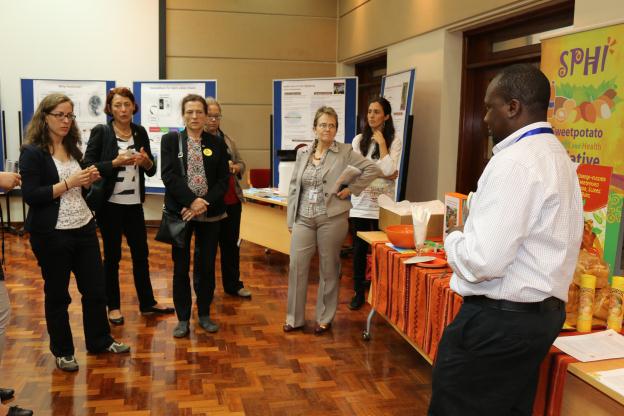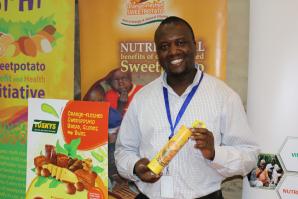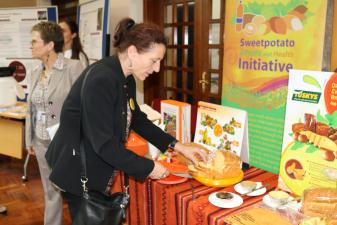
On 16 November 2015, a high level delegation from BMZ, visited ILRI, where Tawanda Muzhingi presented the International Potato Center’s (CIP) progress in addressing bottlenecks in the sweetpotato value chain in Kenya and efforts to scale up the nutrition benefits of biofortified orange-fleshed sweetpotato (OFSP) with the goal is to reach 1.2 million households with under-5 year old children in Kenya, Malawi, Mozambique, and Rwanda through integrated interventions in agriculture, nutrition, utilization, and marketing to strengthen production and consumption of OFSP.
 The delegation which was made up of Ms. Christel Weller-Molongua (Division Head, GIZ, Agriculture and Rural Development), Ulrike Meier (Desk Officer, BMZ One World, No Hunger Initiative), Andrea Bahm (GIZ-Agriculture Programme Office), Julia Kronberg (Head of Cooperation and Development) and other embassy staff visited the ILRI campus to see first-hand the results of a collaborative engagement between the research institution and funding bodies in Germany.
The delegation which was made up of Ms. Christel Weller-Molongua (Division Head, GIZ, Agriculture and Rural Development), Ulrike Meier (Desk Officer, BMZ One World, No Hunger Initiative), Andrea Bahm (GIZ-Agriculture Programme Office), Julia Kronberg (Head of Cooperation and Development) and other embassy staff visited the ILRI campus to see first-hand the results of a collaborative engagement between the research institution and funding bodies in Germany.
On hand to lead the delegation were Iain Wright, the Deputy Director General and Shirley Tarawali, the Assistant Director General of ILRI. After welcoming remarks and an introduction delivered by Tarawali, the visiting delegation was guided through a series of presentations.
Muzhingi’s work focuses on the development of OFSP puree for industrial use as well as other OFSP product development in sub-Saharan Africa. He introduced the Sweetpotato for Profit and Health Initiative led by the International Potato Center (CIP) that seeks to reduce malnutrition and improve crop income among 10 million African households by 2020 through access to improved varieties of sweetpotato and their diversified use. The initiative is currently active in 17 countries. He outlined the role that the innovations in the use of sweetpotato puree for bakery products played in these efforts. Using the information and education materials on display, Muzhingi described how CIP projects increase nutritional awareness, create demand for OFSP products and train change agents on everything about sweetpotato.
 BMZ has invested significantly in sweetpotato activities in Kenya, by supporting projects that promote the production of sweetpotato flour as well as sweetpotato silage that has been proven to increase both milk yields and milk production.
BMZ has invested significantly in sweetpotato activities in Kenya, by supporting projects that promote the production of sweetpotato flour as well as sweetpotato silage that has been proven to increase both milk yields and milk production.
Muzhingi explained that while sweetpotato flour was also a valuable product, CIP was pushing for increased puree production, because puree resulted in up to 50% wheat substitution, while flour only resulted in 20% substitution. This therefore, meant that puree would result in higher savings generated from reduced wheat importation that would in turn free resources for improving social services such as education and healthcare. The end products made from puree would also have a higher concentration of vitamin A in the end products.
The presentation at the CIP stand ended on a high note, as the guests of honor, led by Meier, tasted the freshly baked sweetpotato bread and received ‘I Love Sweetpotato’ badges from Muzhingi.
